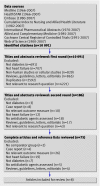Benefits and harms of antidiabetic agents in patients with diabetes and heart failure: systematic review
- PMID: 17761999
- PMCID: PMC1971204
- DOI: 10.1136/bmj.39314.620174.80
Benefits and harms of antidiabetic agents in patients with diabetes and heart failure: systematic review
Abstract
Objective: To review the literature on the association between antidiabetic agents and morbidity and mortality in people with heart failure and diabetes.
Design: Systematic review and meta-analysis of controlled studies (randomised trials or cohort studies) evaluating antidiabetic agents and outcomes (death and admission to hospital) in patients with heart failure and diabetes.
Data sources: Electronic databases, manual reference search, and contact with investigators.
Review methods: Two reviewers independently extracted data. Risk estimates for specific treatments were abstracted and pooled estimates derived by meta-analysis where appropriate.
Results: Eight studies were included. Three of four studies found that insulin use was associated with increased risk for all cause mortality (odds ratio 1.25, 95% confidence interval 1.03 to 1.51; 3.42, 1.40 to 8.37 in studies that did not adjust for diet and antidiabetic drugs; hazard ratio 1.66, 1.20 to 2.31; 0.96, 0.88 to 1.05 in the studies that did). Metformin was associated with significantly reduced all cause mortality in two studies (hazard ratio 0.86, 0.78 to 0.97) compared with other antidiabetic drugs and insulin; 0.70, 0.54 to 0.91 compared with sulfonylureas); a similar trend was seen in a third. Metformin was not associated with increased hospital admission for any cause or for heart failure specifically. In four studies, use of thiazolidinediones was associated with reduced all cause mortality (pooled odds ratio 0.83, 0.71 to 0.97, I2=52%, P=0.02). Thiazolidinediones were associated with increased risk of hospital admission for heart failure (pooled odds ratio 1.13 (1.04 to 1.22), I2=0%, P=0.004). The two studies of sulfonylureas had conflicting results, probably because of differences in comparator treatments. Important limitations were noted in all studies.
Conclusion: Metformin was the only antidiabetic agent not associated with harm in patients with heart failure and diabetes. It was associated with reduced all cause mortality in two of the three studies.
Conflict of interest statement
Competing interests: None declared.
Figures




Comment in
-
Self management of type 2 diabetes.BMJ. 2007 Sep 8;335(7618):458-9. doi: 10.1136/bmj.39315.443160.BE. Epub 2007 Aug 30. BMJ. 2007. PMID: 17761998 Free PMC article.
-
Metformin does not harm diabetic patients with heart failure.J Fam Pract. 2007 Dec;56(12):996. J Fam Pract. 2007. PMID: 18069158 No abstract available.
-
Review: evidence for major benefits and harms of antidiabetic agents for diabetes with heart failure is limited.ACP J Club. 2008 Jan-Feb;148(1):4. ACP J Club. 2008. PMID: 18170991 No abstract available.
-
Review: evidence for major benefits and harms of antidiabetic agents for diabetes with heart failure is limited.Evid Based Med. 2008 Feb;13(1):9. doi: 10.1136/ebm.13.1.9. Evid Based Med. 2008. PMID: 18234917 No abstract available.
References
-
- Padwal R, Majumdar SR, Johnson JA, Varney J, McAlister FA. A systematic review of drug therapy to delay or prevent type 2 diabetes. Diabetes Care 2005;28:736-44. - PubMed
-
- Kannel WB, Hjortland M, Castelli WP. Role of diabetes in congestive heart failure: the Framingham study. Am J Cardiol 1974;34:29-34. - PubMed
-
- Nichols GA, Hillier TA, Erbey JR, Brown JB. Congestive heart failure in type 2 diabetes: prevalence, incidence, and risk factors. Diabetes Care 2001;24:1614-9. - PubMed
-
- Chae CU, Glynn TJ, Manson JE, Guralnik JM, Taylor JO, Pfeffer MA. Diabetes predicts congestive heart failure risk in the elderly. Circulation 1998;98(suppl I):721
Publication types
MeSH terms
Substances
LinkOut - more resources
Full Text Sources
Other Literature Sources
Medical
